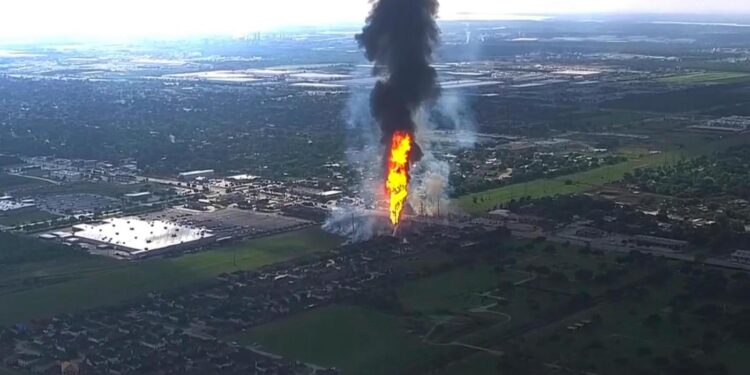
DEER PARK, Texas — A massive pipeline fire burning for hours Monday near Houston began after vehicle struck an above-ground valve after driving through a fence, officials said.
Officials in Deer Park said their police and local FBI agents have found no evidence of “terroristic activity.” They said it also appears to be an isolated incident.
The investigation is ongoing and includes an effort to identify the driver.
The pipeline explosion erupted in a towering flame over neighborhoods for hours on Monday, forcing evacuations and shelter orders and melting playground equipment as firefighters struggled to keep nearby homes from burning.
Operators shut off the flow of natural gas liquids, but so much remained in the 20-inch (51-centimeter) pipeline that firefighters could do nothing but watch and hose down adjacent homes until it burns itself out. That could take hours, perhaps into Tuesday, Deer Park Mayor Jerry Mouton Jr. said.
“The fire, it’s very hot, so a lot of the house structures that are adjacent to that are still catching on fire even though we’re putting a lot of water on them,” Mouton said.
Local authorities would not speculate about the cause of the fire and what role a burned car near the source of the flame may have had. The pipeline’s owner, Dallas-based Energy Transfer, said in a statement that it was “aware of early reports” that a car had struck some valve equipment but did not offer more details, including the origin of those reports.
One firefighter sustained a minor injury, the only one reported so far.
Firefighters were dispatched at 9:55 a.m., after an explosion at a valve station in Deer Park and right next to La Porte rattled adjacent homes and businesses. Nearly 1,000 homes are in the evacuation area, said Lee Woodward, a spokesperson for La Porte.
Geselle Melina Guerra said she and her boyfriend heard the explosion as they were having breakfast in their mobile home.
“All of a sudden we hear this loud bang and then I see something bright, like orange, coming from our back door that’s outside,” said Guerra, who lives within the evacuation area.
Her boyfriend woke up his brother and they ran to their car.
“I was just freaking out, pacing around the living room, not really knowing what to do or what was happening,” Guerra said. “I thought maybe it was an airplane that had crashed down by our house.”
Students at several public schools were told to shelter in place as law enforcement blocked off a wide area. Some evacuees gathered at nearby San Jacinto College, which closed its campus after the explosion. They included Evan Wyman, who was reunited with her dog, Baxter, after officers went into her home.
“I just know that my dog is rescued,” Wyman said.
Letting the fire burn out is better, from an environmental perspective, than trying to attack the flames with some kind of suppressing foam or liquid, said Ramanan Krishnamoorti, a petroleum engineering professor at the University of Houston.
“Otherwise it’s going to release a lot of volatile organics into the environment,” he said.
Still, there will undoubtedly be negative environmental consequences, including a release of soot, carbons and organic material, he said.
Energy Transfer said air monitoring equipment was being set up near the plume of fire and smoke, which could be seen from at least 10 miles (16 kilometers) away.
A statement from Harris County Pollution Control on Monday afternoon said no volatile organic compounds had been detected. The statement said particulate matter from the smoke was moderate and not an immediate risk to healthy people, although “sensitive populations may want to take precautions.”
Natural gas liquids are used primarily in the manufacturing of plastics and basic and intermediate chemicals, Krishnamoorti said.
Houston, Texas’ largest city, is the nation’s petrochemical heartland and is home to a cluster of refineries and plants and thousands of miles of pipelines. Explosions and fires are a familiar sight in the area, including some that have been deadly, raising recurring questions about the adequacy of industry efforts to protect the public and the environment.
Sanchez said they’re used to evacuations because they live close to other plants near the highway, but he hadn’t seen an explosion before in his 10 years living there.
“We just drove as far as we could because we didn’t know what was happening,” Sanchez said from a parked car at a gas station near his college.
The fire burned through nearby power lines, and the website PowerOutage.us said several thousand customers were without power at one point in Harris County.
In addition to damage closest to the flame, the area’s extensive pipeline infrastructure will also have to be closely inspected and monitored for damage, Krishnamoorti said.
“All of those are going to have to be checked and monitored,” he said, but “in the grand scheme of things,” the fire “won’t be a major disrupter of supply chains.”
AP writers Christopher L. Keller in Albuquerque, New Mexico, Valerie Gonzalez in McAllen, Texas, and Sean Murphy in Oklahoma City contributed to this report.




